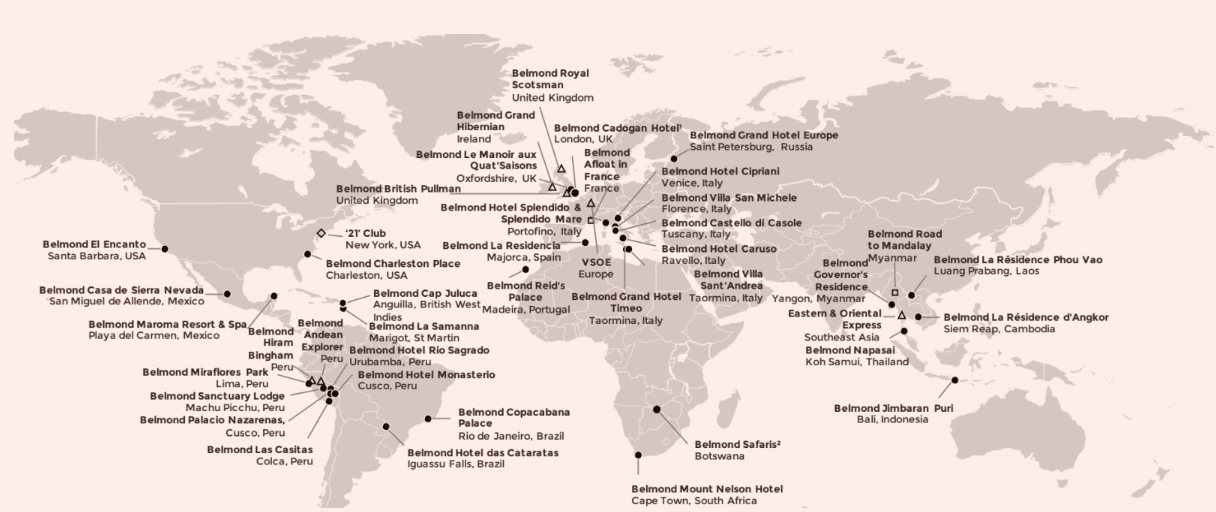But what does LVMH have to do in the hotel business? Part of the answer is that the group is already there: it operates hotels, via two brands. LVMH's ultra-luxury hotel business is called Cheval-Blanc, with offices in Courchevel, the Maldives, Saint-Barthélémy and soon in Paris (La Samaritaine) and Saint-Tropez (Résidence de la Pinède). Olivier Lefebvre, Managing Director of LVMH Hotel Management, has built up his experience at Starwood, one of the major players in the sector. The group also operates through Bulgari Hotels & Resorts, in partnership (50%) with Marriott. This chain already has establishments in Milan, London, Bali, Beijing, Dubai and Shanghai (523 rooms in total). Establishments in Paris, Moscow and Tokyo are planned by 2020 (a total of 239 rooms).
Six times more hotels with Belmond
But Belmond could mark a turning point. Cheval Blanc is the version of an emblematic internal brand, which is intended to remain in the confidentiality of ultra-luxury. At Bulgari Hotels & Resorts, the Italian brand, a subsidiary of LVMH, contributes its know-how, brand and design, with Marriott providing operational management. Cheval Blanc and Bulgari Hotels & Resorts represent a total of nine very select hotels at the end of 2018.
Belmond means 46 more hotels, trains and river cruises in 24 countries. LVMH will pay $3.2 billion to buy the company listed in New York (including $600 million in debt). Belmond's sales reached $572 million and its Ebitda margin 24.5%. Until 2014, the company was still called Orient-Express Hotels. Among its most emblematic assets are the Cipriani in Venice, the Splendido in Portofino or the Copacabana Palace in Rio de Janeiro.
An offer aimed at "demanding customers", with "rare experiences" and "emblematic assets" in "some of the most exceptional places in the world": Bernard Arnault is full of praise for Belmond's portfolio, which he considers "perfectly complementary" to the Cheval Blanc and Bulgari houses. It should be noted that the brand generally owns or co-owns its hotels, which is a rarity in a sector now dominated by the "asset light" strategy (operators rent the walls of hotels).
A new brick in the strategy?
Given the weight of the luxury items sold by LVMH, it is probably premature to imagine that the hotel industry could become a major division. At present, it is already difficult to know the financial performance of the assets concerned. They are included in the "other activities" segment of LVMH's accounts, which also include holding company expenses and which therefore show negative revenues of €596 million and losses of €357 million (vs. 2017 revenues of €42.6 billion). These other activities include the media division in France (Les Echos, Investir, Le Parisien-Aujourd'hui en France, Connaissance des Arts, Radio Classique), the La Samaritaine property complex under renovation in Paris and other investments in the Pierre, the Dutch yacht manufacturer Royal Van Lent, the Cova pastry shop in Milan, the Jardin d'Acclimatation in Paris and LVMH Hotel Management. These "other activities" employed 4,719 people as of December 31, 2017, but integrated the support functions of the headquarters.
"The interest of the operation must be seen in the light of the advantage that exceptional hotels represent in the prospects of great luxury in general, to satisfy the rising class of billionaires whose requirements are increasing," says the research firm Invest Securities, which notes that the market could find the transaction a little expensive given the financial performance posted. Belmond's name change was accompanied by a performance improvement plan that did not really bear fruit. At first glance, Berenberg believes that the transaction has an accretive effect of less than 1% on the group's earnings per share, in other words a drop of water. The rumour of the brand being put up for sale had been circulating for some time. "While some investors may have some questions about this transaction, which seems a little outside LVMH's core business, I think it is consistent with the group's long-term strategy to offer consumers a whole range of high-end experiences," says Zuzanna Pusz, who follows the sector within the German bank.

 By
By 








